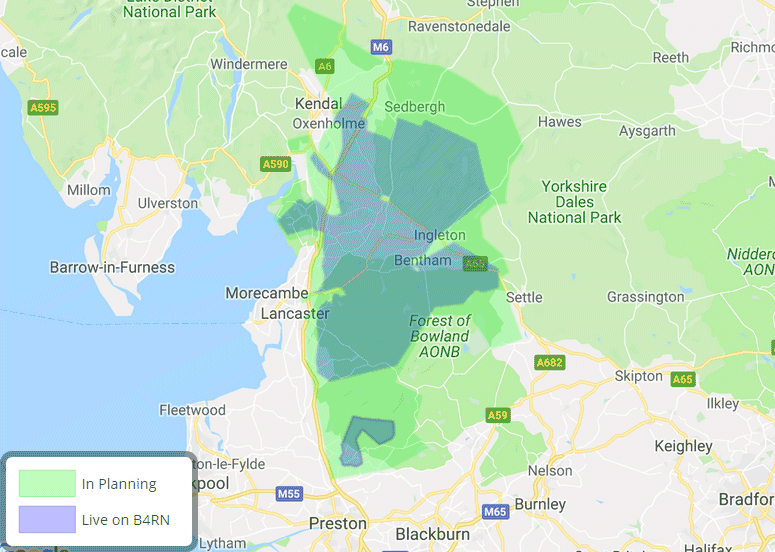Rural UK Full Fibre Broadband ISP B4RN Expand to Create 20 Jobs
Lancashire-based rural ISP B4RN (Broadband for the Rural North) has announced that they intend to almost double their staff count by hiring a further 20 people. The additional hires will help to grow their community built and funded 1Gbps FTTH network to reach more homes in the English countryside.
At present the provider’s Fibre-to-the-Home (FTTH) network has already created well over 5,000 connections (live customers) across remote rural parts of Lancashire, Cheshire, Cumbria, Essex, Norfolk, Suffolk and Yorkshire. The progress is thanks in no small part to B4RN’s tireless army of volunteers, who have helped to build the network (usually in exchange for shares instead of cash) in what would otherwise be an economically unviable area.
The model they’ve adopted also relies on local landowners (e.g. farmers) being generous and agreeing to waive their right to payment under a wayleave (access) agreement, which enables the optical fibre to be affordably dug through their land. As a registered Community Benefit Society (CBS) any profits they make will only ever be distributed back into the communities they serve (i.e. helping to expand the network).
Advertisement
B4RN’s approach also encourages a strong degree of community engagement (i.e. getting locals to help build their own fibre), which in turn fosters impressively high levels of take-up and often in a very short space of time (65% was the last average we saw). As a result they’re rarely worried about competing directly with the likes of Openreach (BT), particularly with an unlimited 1Gbps service only costing £30 per month.
The good news is that B4RN, which currently employs a 30 strong team of general staff and engineers, now intends to harness some of the Government’s recent initiatives and funding structures in order to fuel a new phase of expansion. In order to support this they’re looking to create a further 20 jobs.
A Spokesperson for B4RN told ISPreview.co.uk:
“Recent government initiatives and funding structures are enabling us to expand rapidly. There is a very strong demand for our network to extend to further communities that, because of their location, will never receive decent broadband from other suppliers. We are now looking for additional team members to enable these communities to become part of B4RN.
We now have nearly 30 staff employed locally, and we are looking for around 20 more to join us in all areas of our organisation.”
By the sound of it all of the new hires will go toward supporting their expansion across the North West of England and you can get a good idea of the current plans by looking at their Coverage Page, which lists all of B4RN’s live, on-going and future community deployments.

Advertisement
Admittedly there has been a recent bump in the road after the Government decided that B4RN, as well as other CBS based broadband operators, were no longer eligible to benefit from any tax breaks or other support afforded by the Enterprise Investment Scheme (here). This is because HMRC deemed their approach to be “fundamentally uncommercial” (i.e. not setup to make a profit), which was kind of the point.
Luckily B4RN have almost outgrown the EIS and so its loss will not come as a significant blow, which appears to have been reinforced by today’s announcement. The provider will continue to grow and expand for the foreseeable future.
Mark is a professional technology writer, IT consultant and computer engineer from Dorset (England), he also founded ISPreview in 1999 and enjoys analysing the latest telecoms and broadband developments. Find me on X (Twitter), Mastodon, Facebook, BlueSky, Threads.net and Linkedin.
« Over Half of UK Parents Aware of Network-Level ISP Content Filters

















































Comments are closed